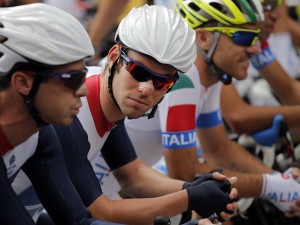
Britain’s Mark Cavendish (center) prepares to start the Men’s Road Cycling race at the 2012 Summer Olympics, Saturday, July 28, 2012, in London. AP Photo/Christophe Ena
LONDON – Mark Cavendish had the hopes of the home nation riding on his shoulders in the Olympic men’s road race. At the end, he was left to sprint for nothing but pride.
The world champion cyclist and his four teammates, including Tour de France winner Bradley Wiggins, had been labeled a “dream team” going into Saturday’s race. All of Britain had hoped Cavendish would be able to secure the country’s first gold on Day 1 of the Olympics being hosted on its home soil.
He couldn’t.
The team was unable to close down a late breakaway that resulted in Alexander Vinokourov of Kazakhstan winning the gold medal. The Isle of Man’s favorite son was a distant 28th, 40 seconds behind Vinokourov, who managed to break clear of Rigoberto Uran down the stretch.
The Colombian rider wound up taking the silver medal, while Norway’s Alexander Kristoff won the bronze. For Britain, there was no medal at all.
“The guys all sat there in the tent absolutely spent. We did everything we could,” Cavendish said afterward. “We didn’t expect any help. We rode the race we wanted to ride.”
Vinokourov even had enough time over the final meters to sit back and soak in the polite cheers of a stunned British crowd. An estimated million-plus people packed the route, and most of them had turned out early to position themselves for a chance to see Cavendish going for gold.
They cheered him all the way to the line, even though the race was lost.
“There were strong guys up the road,” said British leader David Millar, who along with Wiggins and fellow teammates Christopher Froome and Ian Stannard spent most of the day trying to chase down attacks. “We raced the race we wanted to race.”
It simply wasn’t enough.
“What we needed was a couple of guys to help us,” Millar said.
Cavendish was particularly miffed by the tactics of the always-attacking Australian team, which he said raced “negatively.” The British star also wasn’t pleased with a few other teams that he said were content that “if they didn’t win, we wouldn’t win.”
The attacks came early in the 250-kilometer (155-mile) route from Buckingham Palace, where Prince Charles and the Duchess of Cornwall greeted the British team on the starting line.
Wiggins and Co. were forced to counter with a fast pace, yet they still appeared to have the race under control when it headed into the Surrey countryside and began nine loops of Box Hill.
It wasn’t until Belgian rider Philippe Gilbert broke clear late that things got nervous for Britain, and the race still didn’t appear dire until Swiss rider Fabian Cancellara also went clear.
Cancellara eventually crashed on the run-in to the Mall.
By then, the damage was done.
The British team spent the final few miles trying in vain to chase down a pack of about 30 riders working together. The German team lent some help, but the proposition proved too difficult even for a powerhouse program featuring four stage winners and the top two overall from the Tour de France.
“I think they lost the medal because they were thinking of Mark Cavendish the whole time,” said Uran, who rides professionally with Cavendish and some of the other Brits on Team Sky.
“They gave everything they could, but they only had four riders to ride,” American cyclist Tyler Farrar said. “Cav’s not going to ride and sprint, so it’s just not enough.”
Cavendish was also hampered by the absence of race radios, which he’s accustomed to using in professional races. They aren’t allowed in the Olympics, leaving teams to often guess at who made a breakaway and how much time was opening between groups.
“We just kept going and the gap became bigger and bigger,” said Swiss rider Michael Schar, who spent much of the day in breakaways. “That’s when we saw that we were stronger than the British.”
Cavendish had spent most of the year focusing on the Olympics, dropping about eight pounds and rebuilding his body so that he could more easily traverse Box Hill.
The change in his training regimen may have caused him to perform poorly early in the Tour, but two late stage wins — including the finale last Sunday on the Champs Elysees — confirmed his status as the favorite to win Olympic gold.
Cavendish certainly understood he was the focus of his nation, tweeting late Friday, “I am nervous” — an uncensored moment of honesty from someone usually brimming with confidence.
“We rode the race we planned to, but to be fair, it was a slim chance we were going to pull it off,” Millar said. “We needed a lot of things to happen, but with other people racing with the sole tactic to thrash our race up, it was very hard to do it.”

